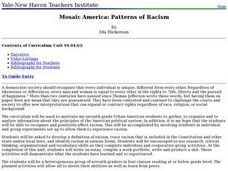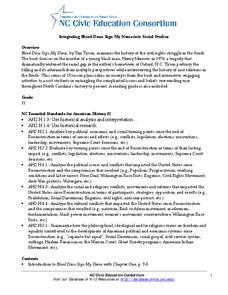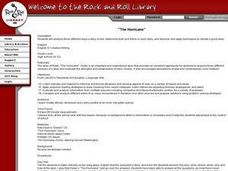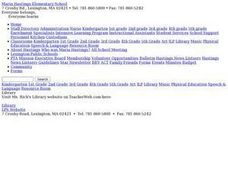Media Smarts
Media Awareness Network: Hate or Debate?
Discuss the difference between legitimate debate on a political issue and arguments that are based on hate through a science-fiction scenario that shows how a controversial issue can be discussed in both ways. Then learn how purveyors of...
Curated OER
The Jacket: Journal Templates Teacher's Guide
Explore this story involving prejudice and racism to enhance learners' comprehension skills. The story The Jacket by Andrew Clements involves an African American boy who is falsely accused of stealing someone's jacket. This teacher's...
Curated OER
Creating a Caring Culture: Appreciating the Diversity of Your School
Young scholars explore community diversity. In this character education lesson, students read the book Is There Really a Human Race? discussing it with their classmates and teachers. Young scholars design paper dolls to represent...
Curated OER
Mosaic America: Patterns of Racism
Seventh graders use print and electronic resources to gather and analyze information on the political system in the United States. Using the Constitution, they identify and discuss instances of racism included in amendments and laws. ...
Curated OER
An Analysis of Jim Crow Laws and their Effects on Race Relations
First graders analyze the role of the Jim Crow laws on race relations. As a class, they are segregated based on the color shirt they have or some other simple criteria and wear either a square or circle sticker representing the majority...
Curated OER
John Gary Evans and the Politics of Race
Young scholars read letters written by Evans and Gunton regarding race relations. In this Progressive Movement lesson, students interpret the intentions and tone of the letters to understand contemporary racial beliefs. Young scholars...
Reading Through History
Tulsa Race Riots
How did the 1921 riots in Tulsa start? Pupils read information about the riots that occurred in Tulsa. Following the reading, they answer multiple-choice questions and guided reading questions to help them along the way.
Curated OER
"Bursting" Stereotypes
Students comprehend the meaning of the word steretype, work in groups to come up with stereotype statements, discuss whether the statements are fair, and write what they learned from the activity. Balloons are used as a conduit in this...
Curated OER
A South African Storm
Students read "A South African Storm" by Allison Howard and participate in a class discussion that examines Howard's letter for both content and writing form. They write a letter using some of the techniques they identified in Howard's.
University of North Carolina
Integrating Blood Done Sign My Name into Social Studies
Tim Tyson's Blood Done Sign My Name is the anchor text in a unit study of the history of race relations and the civil rights struggle in the South. The 11 lessons are richly detailed, and the unit deserves a space in your curriculum...
Curated OER
Kaffir Boy
Students explore the concepts of intolerance and racism in the autobiography Kaffir Boy written by Mark Mathabane. The instructional activity reveals the story's depiction of the terrible toll of apartheid on the lives of individuals.
Curated OER
The Hurricane
Students analyze three different ways a story is told, determine truth and fiction in each story, and discover and apply techniques to narrate a good story.
Students listen to Bob Dylan's "The Hurricane" and watch the "R" rated movie,...
Curated OER
Race & White Privilege
Students read and analyze the Tomas Rivera novel "...And the Earth Did Not Devour Him." In small groups they select three paragraphs from the text that are relevant to the issues of racism or white privelege, conduct Internet research,...
Media Smarts
The Citizen Reporter
Ripped from the headlines! Discuss topical social issues like racism, discrimination, and diversity while exploring the concept of citizen journalism. Begin with a professional-looking presentation on the history of citizen journalism....
Teaching Tolerance
Introducing 'The New Jim Crow'
When Jim Crow Laws ended, the intent behind them did not. Academics read "The New Jim Crow Laws" and an interview from the author to understand how racism has not ended, but rather changed over time. The lesson explains how prejudices in...
Teaching Tolerance
Mass Incarceration as a Form of Racialized Social Control
Mass incarceration: A result of a tough stance on crime or racial discrimination, you decide. Academics explore the history and reasons behind mass incarcerations in the United States and its impact on ethnic communities. The...
Teaching Tolerance
Dismantling Racial Caste
It's time to end racism. The final installment of the series encourages scholars to consider what is needed to ended the racial caste system in the U.S. Young historians complete group discussion, written prompt, and a hands-on-activity...
Digital Public Library of America
The Watsons Go To Birmingham—1963 by Christopher Paul Curtis
A primary source set of photographs, videos, newspaper articles, and FBI reports provides insight into race relations during the 1960s, the Sixteenth Street Baptist Church bombing, and the murder of Emmitt Till. Designed to be used to...
Newseum
Recognizing Bias: Analyzing Context and Execution
Young journalists learn how to identify bias in the news media. First, they watch a video in which a Newseum expert identifies bias in a story about the 1919 Chicago race riots. They then use what they have learned to analyze a recent...
Curated OER
Racist Behavior
Students brainstorm definition of racism, identify forms of racism, including direct and indirect, individual and institutional, and examine effects it may have. Students then discuss whether they have ever experienced or witnessed racism.
Curated OER
Writing About Race
Fourth graders explore racial discrimination focusing on Jim Crow laws. They read an excerpt from Richard Wright's autobiography and discuss how viewing the subject from the his point of view affects their opinions.
Curated OER
Race and Crime in the United States: Are We Victims of Discrimination or Antiheroes?
Using methods adopted by Public Policy Analysts (PPA) class groups define a social problem, gather evidence to document the existence of the problem, identify causes, evaluate existing policies designed to deal with the problem, develop...
Curated OER
Our Unfinished Work
Students investigate the racism elements after the election of President Barack Obama. In this racism instructional activity, students read a recent article about 'post-racial' society. Students compile a list of achieving a post-racial...
Curated OER
Students Speak Out: A Discussion Activity
Students read a collection of student essays addressing racism and racial disparities and discuss them. In this racism lesson plan, students discuss the essays and talk about their impact.

























